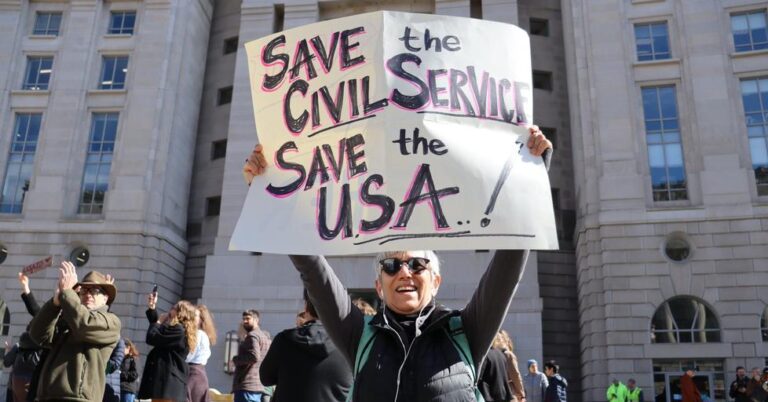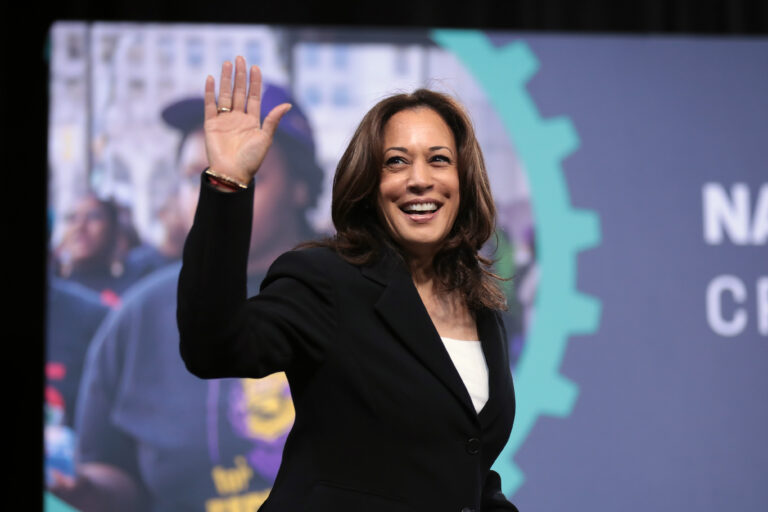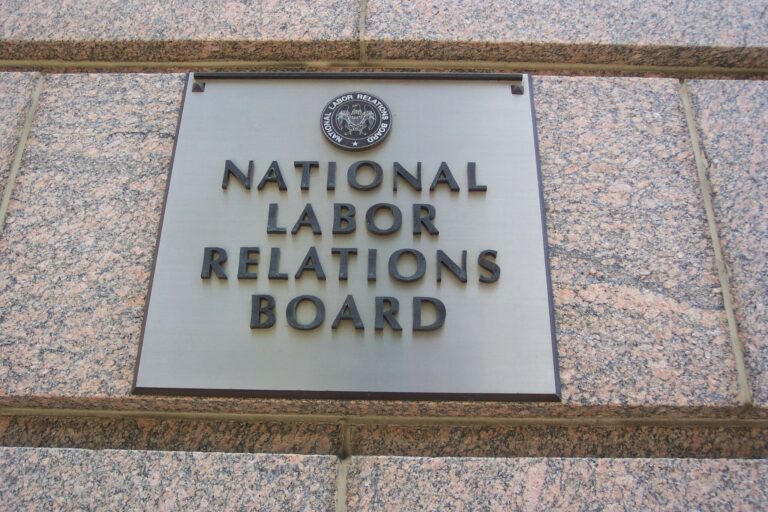On Saturday, Judge Ketanji Brown Jackson for the U.S. District Court for the District of Columbia rejected a series of President Trump’s executive orders. Jackson ruled that boosting federal agencies’ firing rights would deny collective bargaining rights for federal workers. Thus, the three executive orders Trump signed in May violated the NLRA, for they side-stepped requirements that agencies and federal employees’ unions negotiate how and when employees may be fired. According to Judge Jackson, Trump’s unilateral mandates “conflict with congressional intent in a manner that cannot be sustained.” As the New York Times reports, this ruling is the latest in judicial challenges to the Trump administration’s efforts to test – or, exceed – the bounds of executive power. Sharon Block refers to the ruling as a “stinging rebuke” to the Republican take-down of public sector bargaining rights.
Sixteen U.S. states insist that employers can lawfully fire and hire on the basis of sexual orientation or gender identity. These states are urging the U.S. Supreme Court to take on the question of whether Title VII’s ban on sex discrimination prohibits bias against LGBTQ+ employees – a question of “national importance,” according to the states’ amicus brief requesting certiorari on Harris Funeral Homes v. EEOC. In Harris, the Sixth Circuit endorsed the EEOC’s interpretation of Title VII, and held that sexuality or gender discrimination “necessarily” constitutes “sex discrimination”; Harris Funeral Homes could not lawfully fire an employee because she is transgender. With Nebraska’s Attorney General at the helm, the amici states argue that the Sixth Circuit’s ruling “erases all common, ordinary understandings of the term ‘sex’” and “rewrites Title VII in a way never intended or implemented by Congress,” evincing a “failure to apply basic canons of statutory interpretation.” Meanwhile, the EEOC is fighting for DOJ approval to defend its position, and the Supreme Court faces two other opportunities to address the discrimination issue next term.
As the nationwide prison strike continues, organizing power is traveling: individuals incarcerated for immigration violations are joining the effort, according to Newsweek. While numbers of protesters are both difficult to predict and track, due to potential joiners’ fear of severe retaliations and to the inherent opacity of life-behind-bars, reports indicate immigrant detainees in Washington state are also calling to end prison slavery. Protestors held at ICE detention centers request minimum wage payments and conditional contact visits with family. According to the Incarcerated Workers Organizing Committee and the Northwest Detention Center Resistance, hunger strikers persist.
The prison strike is now in its sixth day, and activists continue to focus on inhumane prison labor conditions. As Vox describes, prison wages as low as $0.23 an hour are “cost-effective,” according to the Department of Justice. Parsing government brochures and reports, Alexia Fernández Campbell walks through the “unsettling” ways in which the federal government markets prison labor to other federal agencies and private companies.
Amazon’s warehouses do not support the healthiest working conditions, according to investigative journalists. But Amazon seems to inspire enthusiasm in a few warehouse workers who tweet, and Business Insider reports on suspicions that these yea-sayers are either paid cheerleaders or tech bots.
Last school year, public education systems nationwide were rattled by teacher strikes. This fall, at least one school district is facing the strike rights of other workers upon whom the community depends. In Everett, Washington, members of the International Union of Operating Engineers Local 302 have been striking since Tuesday as they seek new contract terms. The strike is stalling a 33-million-dollar-project for a new YMCA facility, and an 87-million-dollar-upgrade of a high school campus.
Elsewhere in Washington, teachers are continuing to seek pay raises and improved working conditions, and many remain on the picket line as the first day of school approaches. In Longview, teachers and the district will return to negotiations just ahead of opening day on Wednesday, while in Yakima, which opens on Monday, the union is moving forward with a contract deal and has agreed not to strike. The Yakima agreement raises staff pay, but also enhances teacher autonomy and flexibility with lesson planning and renders a suite of standardized tests optional.
The unions that represent 38,000 Disney World employees have agreed to a four-year-contract that significantly raises worker pay. After months of negotiations and public outcry over Disney’s poverty wages – made worse by Orlando’s rising housing costs – employees will see incremental raises from a $10 an hour minimum to $15 by 2021. Last month, unions at California’s Disneyland won a similar fight. Both victories have felt too small, for some, as nonunion and other-union workers are left behind.
In England, many festival- and party-goers are rerouting plans for their summer bank holiday weekend, as members of the Rail, Maritime, and Transport Union at Northern Rail conduct a 24-hour strike. According to the Guardian, in northern England two-thirds of rail service was cut. The Department of Transport called the work stoppage “disappointing.” RMT leaders insist that they are battling “to put public safety before private profit,” as they protest plans to remove on-board security guards and other safety measures.
NPR reports on a 1965 program to fill farm labor needs with U.S. teenagers – male “jocks,” especially. After the U.S. and Mexico concluded the “Bracero” program that brought Mexican laborers onto U.S. farms for short-term agricultural jobs (and exploitation and abuse, as activists like Cesar Chavez stressed), farmers insisted that they would be without willing workers. In response, Secretary of Labor W. Williard Wirtz created the “A-TEAM” (Athletes in Temporary Employment as Agricultural Manpower) and recruited thousands of high school students to enlist for a summer of field work. As one such high schooler remembers, the conditions were nearly unbearable; in Salinas Valley, many walked off the job or went on strike. As Professor Lori Flores explains, the record of student reactions demonstrates that “labor is not meant to be done under such bad conditions and bad wages,” and that because these kids had the “words and whiteness” to advocate for themselves, the experiment failed quickly.










Daily News & Commentary
Start your day with our roundup of the latest labor developments. See all
March 3
In today’s news and commentary, Texas dismantles their contracting program for minorities, NextEra settles an ERISA lawsuit, and Chipotle beats an age discrimination suit. Texas Acting Comptroller Kelly Hancock is being sued in state court for allegedly unlawfully dismantling the Historically Underutilized Business (HUB) program, a 1990s initiative signed by former Governor George W. Bush […]
March 2
Block lays off over 4,000 workers; H-1B fee data is revealed.
March 1
The NLRB officially rescinds the Biden-era standard for determining joint-employer status; the DOL proposes a rule that would rescind the Biden-era standard for determining independent contractor status; and Walmart pays $100 million for deceiving delivery drivers regarding wages and tips.
February 27
The Ninth Circuit allows Trump to dismantle certain government unions based on national security concerns; and the DOL set to focus enforcement on firms with “outsized market power.”
February 26
Workplace AI regulations proposed in Michigan; en banc D.C. Circuit hears oral argument in CFPB case; white police officers sue Philadelphia over DEI policy.
February 25
OSHA workplace inspections significantly drop in 2025; the Court denies a petition for certiorari to review a Minnesota law banning mandatory anti-union meetings at work; and the Court declines two petitions to determine whether Air Force service members should receive backpay as a result of religious challenges to the now-revoked COVID-19 vaccine mandate.